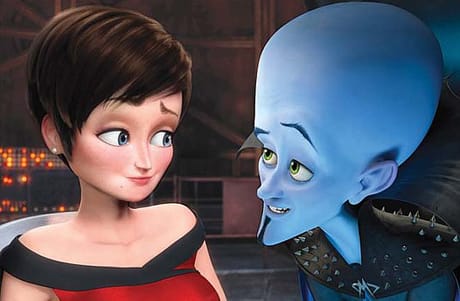Moving past the obvious and redundant criticisms of Megamind — Despicable Me had the same plot and superhero satires are stale — there are some thematic interpolations moderately unique to children's films amongst the array of broad pop culture references and aesthetic as narrative antecedent. It's not revolutionary, fidgeting awkwardly with its nature versus nurture backdrop, afraid of distracting OCD kiddies from superlative 3D effects, but it offers a bit more than its hyper-glossy surface suggests.
Acting as a modified compendium to the Superman mythology, with its opening of infant Megamind (Will Ferrell) shuttling towards Earth during an alien planetary catastrophe, this tale of evil resultant of good detours with Metro Man (Brad Pitt) similarly hurtling towards the third rock from the sun, setting up implicit dualism. Playing on notions of birthright, the babies are raised in opposing environments: Megamind in a prison, with physical differences, and Metro Man in an affluent traditional home, with heightened abilities.
Inevitably, the pair battle it out like the Roadrunner and Wile E. Coyote, with surprise success on the villain's part quite early in the film. With Metro Man seemingly dead, things shuffle to a crisis of identity, with the cackling Megamind wondering what to make of everything without good to oppose him. The answer: woo a Lois Lane-like reporter, in the form of Roxanne Richi (Tina Fey), and create another sparring partner, in dorky cameraman Hal Stewart/Tighten (Jonah Hill).
Aside from its visual prowess, the Marlon Brando impersonations, Donkey Kong references and gags about killing endangered animals that stay in the middle of the road, the film is about as serviceable and mediocre as one might expect from a pseudo-ironic children's satire. Hal Stewart (a Green Lantern reference) jokes about the pointlessness of asking Roxanne about herself since he already knows her archetype and Megamind's minion is actually named Minion (David Cross).
Still, it's hard to criticize mainstream entertainment for being mainstream, especially when there's a strange, existential vein running throughout, relating to identity as a reaction to environment and competition. What's worth noting is that Ferrell and Fey's animated counterparts have far less amusing facial reactions than the actual actors would while reciting the same dialogue.
(Paramount Pictures)Acting as a modified compendium to the Superman mythology, with its opening of infant Megamind (Will Ferrell) shuttling towards Earth during an alien planetary catastrophe, this tale of evil resultant of good detours with Metro Man (Brad Pitt) similarly hurtling towards the third rock from the sun, setting up implicit dualism. Playing on notions of birthright, the babies are raised in opposing environments: Megamind in a prison, with physical differences, and Metro Man in an affluent traditional home, with heightened abilities.
Inevitably, the pair battle it out like the Roadrunner and Wile E. Coyote, with surprise success on the villain's part quite early in the film. With Metro Man seemingly dead, things shuffle to a crisis of identity, with the cackling Megamind wondering what to make of everything without good to oppose him. The answer: woo a Lois Lane-like reporter, in the form of Roxanne Richi (Tina Fey), and create another sparring partner, in dorky cameraman Hal Stewart/Tighten (Jonah Hill).
Aside from its visual prowess, the Marlon Brando impersonations, Donkey Kong references and gags about killing endangered animals that stay in the middle of the road, the film is about as serviceable and mediocre as one might expect from a pseudo-ironic children's satire. Hal Stewart (a Green Lantern reference) jokes about the pointlessness of asking Roxanne about herself since he already knows her archetype and Megamind's minion is actually named Minion (David Cross).
Still, it's hard to criticize mainstream entertainment for being mainstream, especially when there's a strange, existential vein running throughout, relating to identity as a reaction to environment and competition. What's worth noting is that Ferrell and Fey's animated counterparts have far less amusing facial reactions than the actual actors would while reciting the same dialogue.
